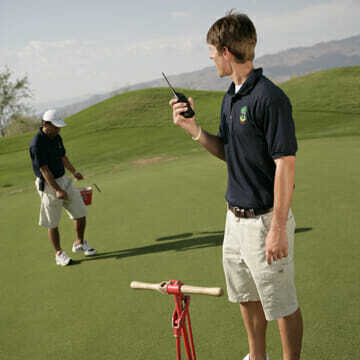

Golf courses pose distinctive management challenges. Functioning much like expansive campuses, they feature widely dispersed infrastructure. As a result, the considerable distances between buildings can make transportation and logistics complex. Additionally, maintaining a quiet environment is essential to avoid disrupting patrons, particularly when golfers are preparing to take a swing. Careful planning and sensitivity to these factors are crucial for effective golf course management.
Radios are indispensable tools for effective management of golf courses. The head groundskeeper must maintain communication with crew members who are dispersed across a vast area. This connectivity is vital to ensure the optimal condition of essential facilities—including the clubhouse, restrooms, snack bars, fairways, and greens—all of which greatly influence the course’s overall appeal.
Regular maintenance tasks such as watering the grass, manicuring the greens, trimming trees, and relocating holes are necessary to preserve the integrity and aesthetics of the grounds. Often, the sprinkler systems are operated remotely using DTMF signals transmitted by radio to activate various watering zones.
Watering the entire course simultaneously is impractical, as it would not only disrupt play for all golfers but also significantly reduce water pressure throughout the property. Furthermore, since the water zone valves are scattered across different locations, installing a centralized, hardwired irrigation system is typically not feasible. For these reasons, radios are employed to efficiently control and coordinate the watering systems from a distance.

Nearly all country clubs require efficient communication with the clubhouse to coordinate a wide range of services, including retail shops, food and beverage operations, the starter’s house, golf club storage, health spa maintenance, tennis court management, and weight room supervision. In addition, some country clubs feature on-site hotels, introducing further logistical needs such as bell service and housekeeping coordination. To effectively manage these diverse activities and ensure seamless operations, reliable two-way radio communication is essential.
Click here to view an interactive presentation on Communications Solutions for Retail. There are many interactive features in the presentation by clicking on the arrows.

Certainly! Here’s a refined version of your text: Most golf courses are not constructed on flat land, as level terrain tends to offer golfers a less engaging experience. Players typically appreciate the natural beauty and challenges presented by hills, streams, lakes, and other landscape features. While these elements enhance the golfing experience, they also introduce unique difficulties for radio communication, since uneven terrain can obstruct radio signals. Some relatively flat golf courses can function effectively without repeaters, but the majority require centralized repeaters to ensure adequate coverage across the property. Additionally, as with many operations, the need for multiple talk groups is common, often necessitating several repeaters to maintain reliable radio communication throughout the course.
Digital radio is often the solution to the problems associated with golf courses. DMR radios offer the advantage of getting two talk groups from one repeater. NEXEDGE digital radios offer a solution to coverage issues because the very narrowband digital will get 20% better range than the equivalent analog radio or the equivalent DMR radio, thus solving coverage issues. Since each property is different, the solution needs to be matched with the challenges offered by the property in question. Read more…
